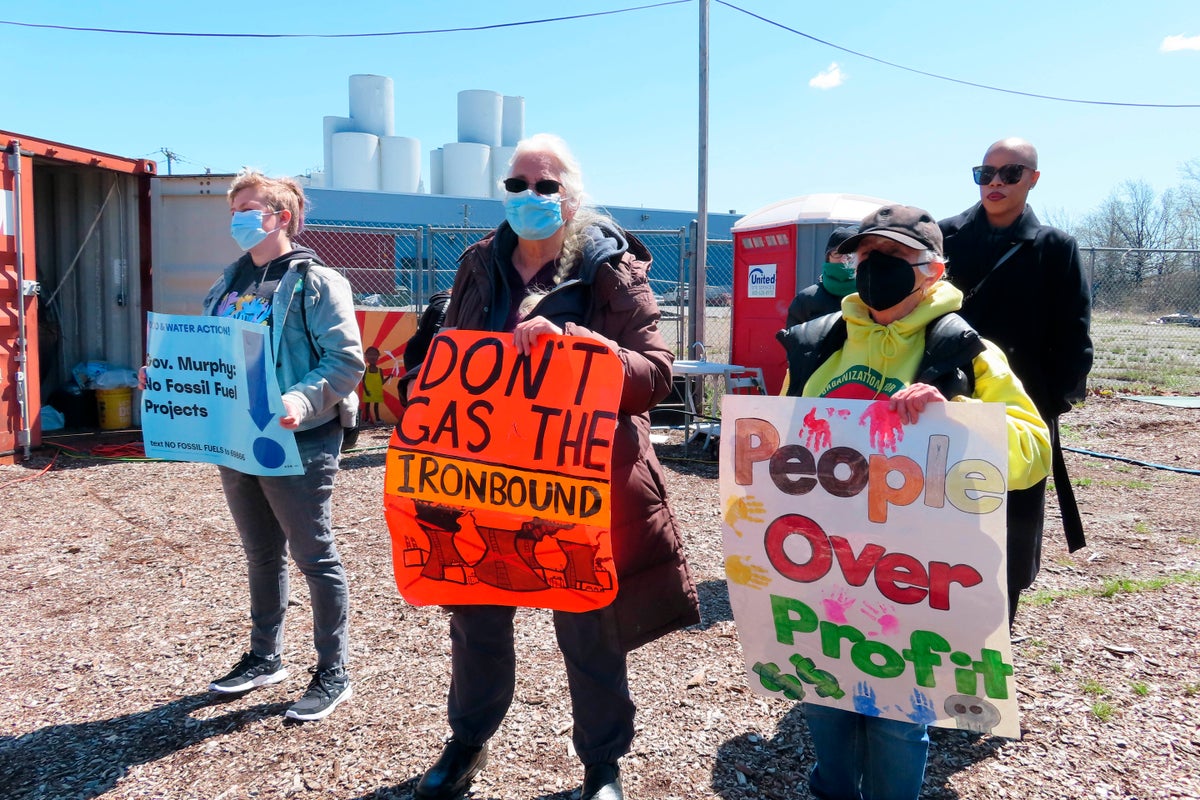
Residents of largely minority areas in New Jersey are fighting three proposed gas-fired power plants as they wait for the state's environmental justice law — signed with great fanfare nearly three years ago — to take full effect.
And the waiting is not easy in communities like Newark, where pollution can be part of everyday life.
Two new gas-fired backup power plants are proposed for the Newark area. Both aim to provide emergency power in the event of severe storms like Superstorm Sandy, which knocked out electricity in 2012, caused nearly a billion gallons of raw sewage to flow into area waterways, and flooded trains and equipment in a rail yard.
The backup power plants for the Passaic Valley Sewerage Commission's treatment plant in Newark, and for NJ Transit, the state transportation agency in nearby Kearny, are particular targets for residents of Newark's Ironbound neighborhood.
That neighborhood suffers from multiple sources of pollution from nearby power plants, an international airport, numerous highways and heavy truck traffic through residential neighborhoods.
Ironbound "is already one of the worst polluted neighborhoods in the entire country,” said Maria Lopez-Nuñez, a leader of the Ironbound Community Corporation neighborhood group.
“The community of Newark has repeatedly voiced that this plant is not wanted, despite the attempts to threaten us with more flooding," she said. “We know that this plant won’t stop us from flooding but will guarantee more health issues in our community.”
On Monday, Newark's mayor and over 20 state lawmakers wrote to Gov. Phil Murphy asking him to reject the proposal in favor of one powered by renewable clean energy.
“This plant does not symbolize progress, nor does it address the need to strengthen the state’s commitment to remediate the disproportionate pollution minority communities find themselves burdened with,” Mayor Ras Baraka said.
Underlying the debate over whether the three projects should be built — and where they should go — is an environmental justice law New Jersey's Democratic governor signed in 2020. The measure is designed to protect already overburdened communities, many of them inhabited largely by minorities, from having to accept additional sources of pollution.
Murphy called it "the strongest environmental justice law in the nation.”
But the law still has not taken full effect, and won't do so at least until June, leaving its potential impact on the proposals uncertain.
Larry Hajna, a spokesman for the state Department of Environmental Protection, said the state developed regulations informed by 18 months of outreach efforts to affected communities and entities that would be regulated by the law. He said the proposed regulations are in their final stages of review.
“The Murphy administration is committed to furthering the promise of environmental justice for all New Jerseyans, efforts of which include the implementation of the state’s landmark environmental justice law, in addition to other programs that improve conditions and health outcomes for residents in underserved and overburdened communities,” he said.
The gap between the law's signing and when it may take effect is frustrating to many residents.
“Newark residents need action, not lip service," said Kim Gaddy, founder of Newark's South Ward Environmental Alliance. “Whatever the intentions, PVSC’s plan unavoidably poisons our already too-poisoned lungs and adds to the climate emergency.”
Residents in and around Newark and Jersey City also have been fighting a proposed backup power station in nearby Kearny, which also was proposed as a storm resiliency project designed to ensure train service during major storms. During a board meeting earlier this month, the agency put off a decision until April 2024.
Liz Ndoye, a Hoboken activist fighting the plant, said residents are "calling on Gov. Murphy to fulfill his promise to reverse decades of environmental injustice by stopping NJ Transit’s proposal for a new power plant and instead invest in a clean, renewable alternative.”
NJ Transit did not respond to a request for comment Monday.
And in Woodbridge, about 22 miles (35 kilometers) south of Newark, the proposed construction of a new gas-fired power plant by a company that already operates one there is drawing opposition from organizations including the local NAACP chapter. That group accuses the DEP of “cutting corners” in its environmental justice review of the proposal.
“This plant would go against environmental justice,” said Rev. Donna Stewart, the president of the group's chapter in Perth Amboy, next door to Woodbridge. “The NAACP is a civil rights organization, and environmental justice falls under civil rights of our people.”
Competitive Power Ventures, the Silver Spring, Maryland-based company proposing the plant, did not respond to a request for comment Tuesday. Its website describes the proposal as an upgraded use of an abandoned chemical plant.







